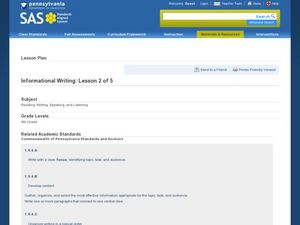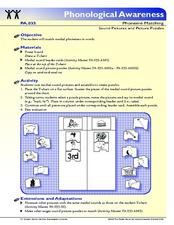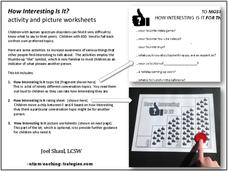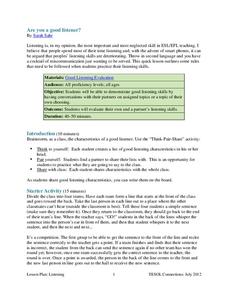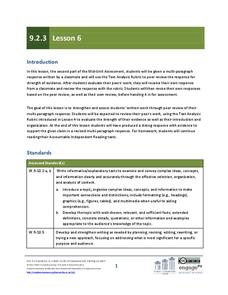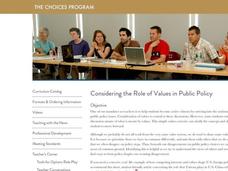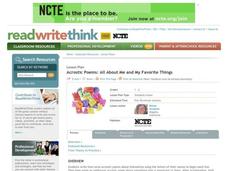Curated OER
Quotation Response Speech: Public Speaking Skills
Improve high schoolers' public speaking with an engaging activity. Class members select three personally relevant quotes from a list. They then write a short speech for each quote, explaining how the quotes are personally relevant....
Curated OER
Organ Systems
Students examine organisms that are composed of tissues, organs, and systems. They dissect a fetal pig and explore the assigned organs systems such as the skeletal, muscular, and circulatory organs. Students identify and explain their...
Curated OER
What Would You Do?
Students explain how we all face tough decisions everyday. They show how they respond to those events reveals who they are and where they are in their character/moral development. Students predict how to deal with peer pressure and...
Curated OER
Ratiocination
Writers use the four steps outlined here to edit their own or a peer’s paper. Using different colors of highlighters, editors note “to be” verbs, examine the length of sentences, box the first word in every sentence, and mark instances...
Curated OER
Sincerely Yours
Learners write a friendly letter. They write a friendly letter to author, Cynthia Rylant, after reading a number of her books, and watch a presentation by the teacher that describes how to write the letter. They word process their...
Pennsylvania Department of Education
Informational Writing: Lesson 2 of 5
Introduce expository writing to your elementary learners. Young authors write a three-paragraph informational paper using the steps of the writing process. They follow guided lessons to experience each of five steps. Included are tons of...
Florida Center for Reading Research
Phonics: Letter-Sound Correspondence, Letter-Sound Bingo
Young scholars build a strong understanding of medial sounds, vowels, and letter sound correspondence while playing Bingo. Taking turns, peers choose a card and say its name and medial sound; all players look for the vowel on their card....
Florida Center for Reading Research
Phonemic Awareness: Phoneme Matching, Sound Pictures and Picture Puzzles
Scholars use a T-chart and puzzle pieces to practice saying and recognizing the medial sound in a series of words. Peers take turns choosing a puzzle piece, saying its name and medial sound, then placing it on their side of the chart.
Florida Center for Reading Research
Fluency: Connected Text, Choral Reading
Set up beginning readers into choral reading groups to aid with fluency. Scholars each have a copy of the text, and one begins reading as the rest of the group choral reads along. They each take a turn being the first reader, allowing...
Curated OER
Compare and Contrast Essay Checklist
Are you looking for a basic checklist your writers can use as they edit a peer's compare/contrast essay? Reviewers simply check yes or no for each of the criteria listed in three categories, and then use the space at the bottom...
Virginia Department of Education
Writing for Workplace and Postsecondary Correspondence
Create or expand your college essay and career unit with a business and postsecondary writing activity. The exercise works for college-bound or job-hunting junior or senior learners. They bring their research concerning a college or...
Kenmore Town of Tonawanda UFSD
Fitness Lesson Worksheet
The best way to really learn something is to teach it! Using this worksheet as their guide, your class members will each create a 20-minute fitness lesson to teach to their peers. Lesson plan template calls for identification of the...
Wordpress
Paper Doll Project
Explore self and social construction with a hands-on art project. After studying and discussing bullying and other social experiences, individuals create three paper dolls that represent specific social constructions. Included here is a...
Curated OER
How Interesting Is It?
Discussing topics that other people are interested in is a key social skill that can often be overlooked. Here is a resource that supports learners in developing this life skill by first prompting them to consider a wide range...
Dream of a Nation
Big6 Research Project
Do research projects at your school look like a class of eighth graders staring at a blank screen? Use the Big 6 research method to guide middle schoolers through the process of finding a topic, searching for and evaluating sources,...
Conflict Resolution Network
Empathy
Children are naturally friendly and communicative, but often have a hard time expressing their emotions in a clear and understandable way. Help them hone their communication skills with a set of activities based on creating empathy,...
TESOL
Are You a Good Listener?
Your learners talk to each other every day, but are they really listening? Use a lesson based on listening skills to ensure that class members feel heard and respected. It includes games, discussion topics, and self-assessment tools...
Annenberg Foundation
Making an Issue-Based Video
Encourage class members to become engaged citizens by researching an issue they are passionate about and then producing a video to present to policymakers, the public, and their peers. Everything needed for the unit is contained in...
Georgia Standards
Sociology Unit Six: Socialization Within the Group
How do we learn the rules of society? How do beliefs and ideas affect these rules? Introduce your young sociologists to the factors that socialize individuals with a unit that uses observation and experimentation to analyze how factors...
Leadership Challenge
Student Appreciation: Nurturing and Developing
How can the growth of leadership qualities be measured? Make the development of leadership behaviors visual! Class members periodically recognize the leadership behaviors of their peers by adding color-coded sand to a jar labeled...
EngageNY
Grade 9 ELA Module 2, Unit 3, Lesson 6
As part of a mid-unit assessment, class members exchange their draft of a multi-paragraph essay with a classmate, review their partner's writing using the provided text analysis rubric, and evaluate the strength of evidence, the...
Brown University
Considering the Role of Values in Public Policy
Strong opinions come from deeply held values. Young citizens explore the values that are most important to them in a class discussion and activity. As they prioritize a list of values cards that include freedom,...
Nosapo
Getting to Know Each Other
How do you do? Guide learners through the basics of conversational English with an extensive set of discussion questions. Class members ask partners more about themselves, including their favorite hobbies, music, and time of day, as well...
National Council of Teachers of English
Acrostic Poems: All About Me and My Favorite Things
Budding poets create two acrostic poems, one for their name and another using a word of their choice. Over the course of five days, scholars compose, revise, publish, and share their work with their peers.
Other popular searches
- Getting Along With Peers
- Communicating With Peers
- Being Kind to Peers
- Global Peers
- Teasing Peers
- Jury of Peers
- Jury of Her Peers
- Interacting With Peers
- Critiquing Peers
- Fitting in With Peers
- A Jury of Her Peers
- Autism and Peers







